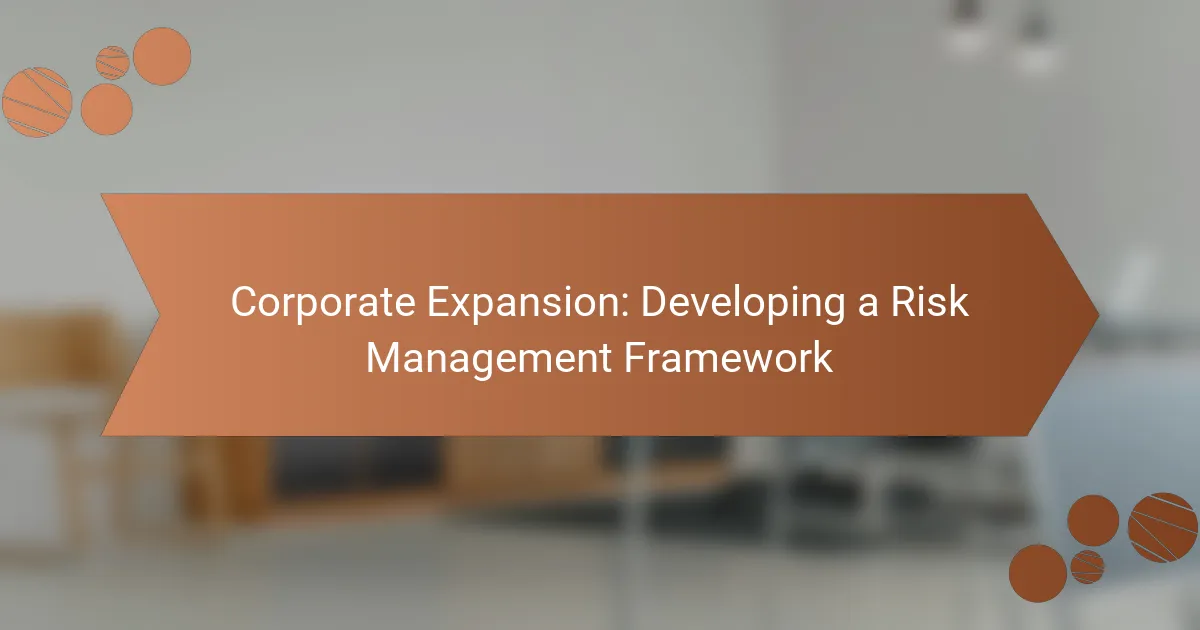Expanding a business involves navigating various risks, making insurance an essential component of a successful strategy. Key options such as general liability, property, and workers’ compensation insurance can safeguard assets and ensure continuity. To effectively protect against potential hazards, companies should also implement comprehensive risk management strategies tailored to their specific needs and circumstances.

What insurance options are available for corporate expansion?
When expanding a business, various insurance options can help mitigate risks and protect assets. Key types include general liability, property, workers’ compensation, business interruption, and professional liability insurance.
General liability insurance
General liability insurance protects businesses from claims related to bodily injury, property damage, and personal injury. This coverage is essential for any company, as it can cover legal fees and settlements resulting from lawsuits.
When considering general liability insurance, assess the specific risks associated with your industry. Premiums can vary widely based on factors such as business size, location, and claims history, typically ranging from a few hundred to several thousand dollars annually.
Property insurance
Property insurance covers physical assets like buildings, equipment, and inventory against risks such as fire, theft, or vandalism. This type of insurance is crucial for businesses that own or lease physical space.
Evaluate the value of your property and the potential risks in your area to determine the appropriate coverage. Policies can be tailored to include replacement cost or actual cash value, affecting premiums significantly.
Workers’ compensation insurance
Workers’ compensation insurance provides wage replacement and medical benefits to employees injured on the job. This insurance is often legally required and protects both employees and employers from lawsuits related to workplace injuries.
Premiums for workers’ compensation vary based on the industry, the number of employees, and the company’s claims history. It’s important to maintain a safe work environment to help keep costs down and comply with local regulations.
Business interruption insurance
Business interruption insurance compensates for lost income during periods when a business cannot operate due to covered events, such as natural disasters or fires. This coverage helps maintain cash flow during recovery periods.
When selecting a policy, consider the potential length of downtime and the income you would need to cover expenses. Ensure that the coverage amount aligns with your business’s revenue and fixed costs to avoid financial strain during interruptions.
Professional liability insurance
Professional liability insurance, also known as errors and omissions insurance, protects businesses against claims of negligence or inadequate work. This is particularly important for service-oriented businesses and professionals like consultants and healthcare providers.
Assess the specific risks associated with your services to determine the necessary coverage limits. Premiums can vary based on the profession, with some industries facing higher risks and, consequently, higher costs for coverage.

How can businesses protect against risks during expansion?
Businesses can protect against risks during expansion by implementing comprehensive risk management strategies. This includes conducting thorough risk assessments, establishing safety protocols, and investing in employee training to mitigate potential hazards.
Conducting risk assessments
Risk assessments are essential for identifying potential threats that could impact a business during its expansion. This process involves analyzing various factors such as market conditions, operational challenges, and regulatory compliance. Businesses should regularly evaluate risks to adapt their strategies accordingly.
To conduct effective risk assessments, companies can use tools like SWOT analysis (Strengths, Weaknesses, Opportunities, Threats) or risk matrices. These tools help prioritize risks based on their likelihood and potential impact, allowing businesses to focus on the most critical areas.
Implementing safety protocols
Establishing safety protocols is crucial for minimizing risks associated with workplace hazards. These protocols should be tailored to the specific environment and operations of the business. Regular reviews and updates of these protocols ensure they remain effective and compliant with local regulations.
Common safety protocols include emergency response plans, equipment safety checks, and health guidelines. For instance, a construction company may implement strict safety measures such as hard hat requirements and fall protection systems to safeguard workers on-site.
Investing in employee training
Investing in employee training enhances risk protection by equipping staff with the necessary skills to handle potential challenges. Training programs should cover safety practices, operational procedures, and compliance with industry regulations. This proactive approach helps reduce accidents and improves overall efficiency.
Businesses can consider various training methods, such as workshops, online courses, and simulations. Regular refresher courses keep employees updated on best practices and reinforce the importance of safety in the workplace, ultimately fostering a culture of risk awareness.

What factors should be considered when choosing insurance for expansion?
When selecting insurance for corporate expansion, consider factors such as business size, industry-specific risks, geographic location, and regulatory requirements. Each of these elements can significantly influence the type and extent of coverage needed to mitigate potential risks effectively.
Business size and structure
The size and structure of your business play a crucial role in determining insurance needs. Larger companies may require more comprehensive coverage due to increased exposure to risks, while smaller businesses might focus on basic policies that cover essential liabilities. Assessing the organizational structure, such as whether you’re a sole proprietorship or a corporation, can also influence the types of policies suitable for your expansion.
For example, a corporation may need directors and officers (D&O) insurance to protect against claims related to management decisions, while a small business might prioritize general liability insurance to cover everyday operational risks.
Industry-specific risks
Different industries face unique risks that can impact insurance requirements. For instance, a construction company may need coverage for equipment damage and worker injuries, while a tech firm might focus on cybersecurity insurance to protect against data breaches. Understanding these specific risks is essential for tailoring your insurance strategy effectively.
Conducting a risk assessment can help identify the potential hazards associated with your industry, allowing you to choose policies that provide adequate protection against those threats.
Geographic location
Your geographic location can significantly affect insurance options and costs. Areas prone to natural disasters, such as floods or earthquakes, may require additional coverage, while businesses in urban settings might face higher liability risks due to increased foot traffic. It’s essential to evaluate local conditions and how they may impact your insurance needs.
For example, a business in a hurricane-prone area might consider purchasing flood insurance, while one in a densely populated city may need higher liability limits to cover potential claims from customers or clients.
Regulatory requirements
Compliance with local regulations is vital when selecting insurance for expansion. Different regions have specific requirements regarding minimum coverage levels, types of insurance mandated for certain industries, and reporting obligations. Failing to meet these regulations can lead to penalties and increased liability.
Researching local laws and consulting with an insurance professional can help ensure that your business meets all necessary requirements, protecting you from legal issues while expanding your operations.

How does corporate expansion impact insurance costs?
Corporate expansion typically leads to increased insurance costs due to the need for broader coverage and heightened risk exposure. As businesses grow, they encounter new liabilities and regulatory requirements that can significantly affect their insurance premiums.
Increased coverage needs
As companies expand, they often require more comprehensive insurance coverage to protect against various risks. This can include general liability, property insurance, and specialized policies tailored to new operations or markets. For instance, a business entering a new country may need to comply with local regulations, which can necessitate additional coverage types.
It’s crucial to assess the specific risks associated with new ventures and ensure that the insurance policy reflects these needs. Regularly reviewing and updating coverage can help avoid gaps that may lead to financial losses.
Higher risk exposure
Expansion often increases a company’s exposure to risks, such as operational hazards, market fluctuations, and legal liabilities. For example, entering a new industry may introduce unforeseen challenges that require enhanced risk management strategies. This higher risk can lead to increased premiums as insurers adjust their rates based on the perceived likelihood of claims.
Businesses should conduct thorough risk assessments during expansion to identify potential vulnerabilities. Implementing robust safety protocols and risk mitigation strategies can help manage these exposures and potentially lower insurance costs over time.
Market competition
The competitive landscape can also influence insurance costs during corporate expansion. As more businesses enter a market, insurers may adjust their pricing strategies to remain competitive. This can lead to fluctuations in premiums based on demand and supply dynamics within the insurance sector.
Companies should shop around for insurance quotes and consider working with brokers who understand the nuances of the industry. Comparing multiple options can help identify the best coverage at a competitive price, ensuring that businesses are not overpaying as they expand.



